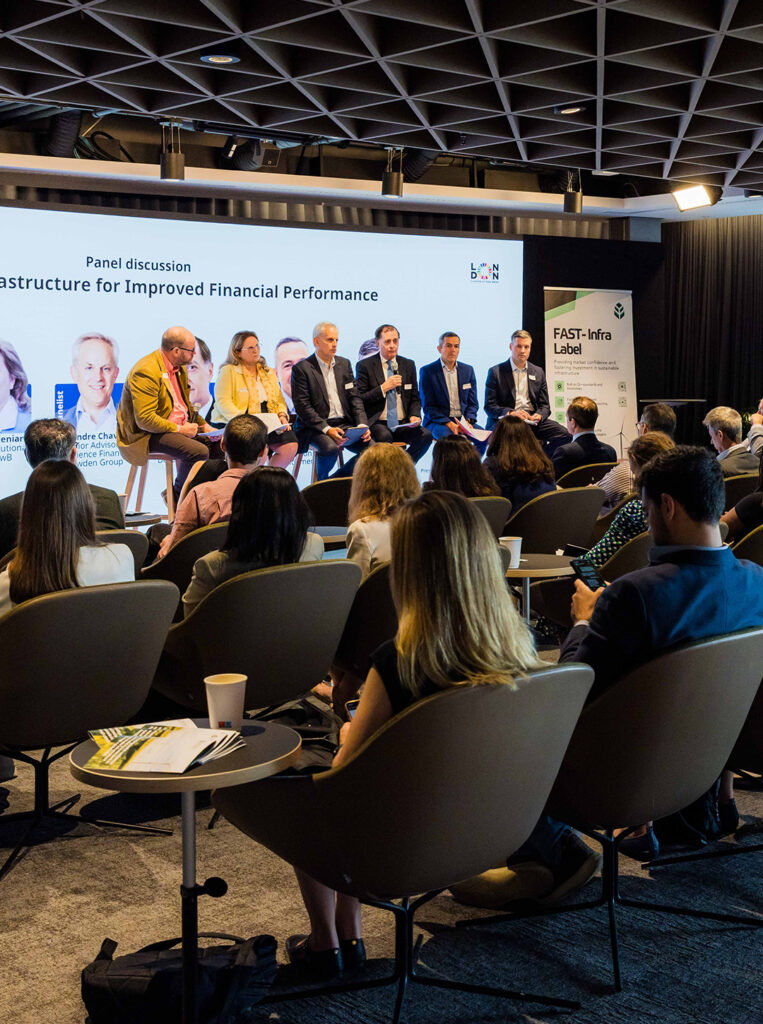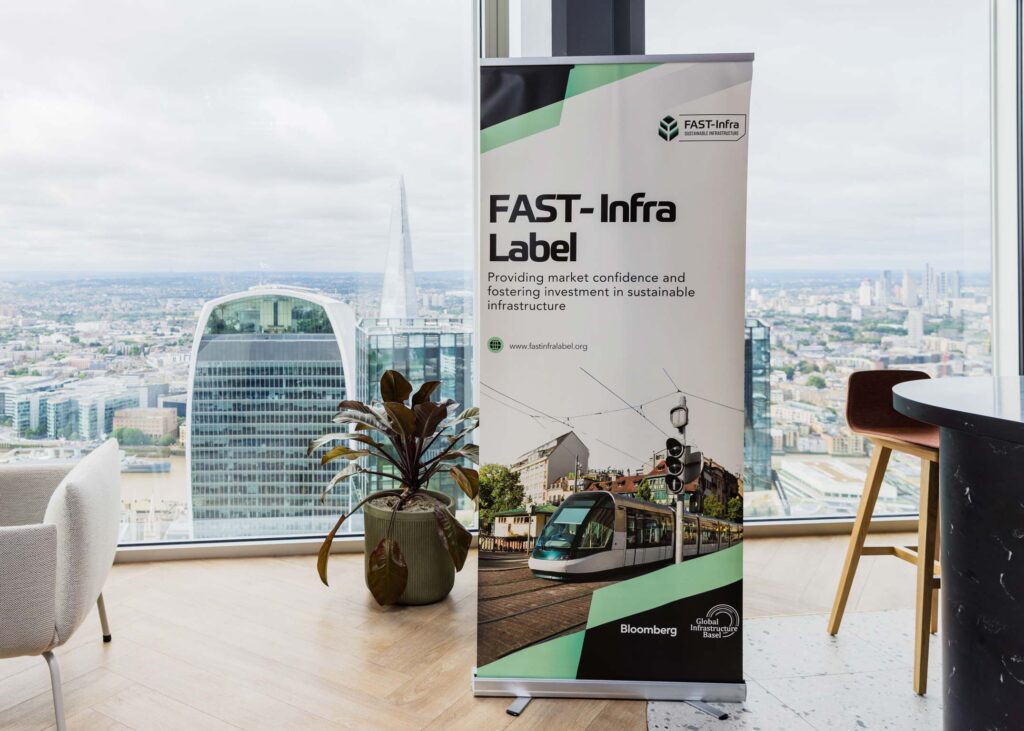
TWIN TALKS | LONDON CLIMATE ACTION WEEK
INSIGHTS FROM LONDON CLIMATE WEEK 2025
With an estimated global infrastructure investment gap of USD 15 trillion by 2040, stakeholders across the world agree on a shared vision: we must finance sustainable, safe, and affordable infrastructure that leaves no one behind. This challenge is especially pressing in developing and emerging markets, where rapid urbanization underscores the urgency of action. Infrastructure is the fastest-growing alternative asset class, yet it accounts for less than 1% of total global Assets under Management (AuM). Closing the infrastructure investment gap requires a fundamental shift in capital allocation strategies.
FAST-Infra Label and Bentley Systems are co-hosting this event during London Climate Action Week to harness the power of cross-sector collaboration in accelerating sustainable infrastructure practices that drive long-term financial performance.
Event Agenda:
Opening Remarks
Welcome address and keynote by Mark Coates, Vice President of Infrastructure Policy Advancement, Bentley.
Keynote Speech
Hayden Morgan, Partner, Head of Climate & Sustainability Consulting, Pinsent Masons LLP
Panel Discussion experts sharing best practices and lessons learned.
Robert Spencer, (Moderator) Global Lead – Strategic Sustainability Advisory, AECOM
James Dunham, Dalmore Capital
Philippe Valahu, CEO, PIDG
Marcos Martinez, Head of the PPP Advisory Unit, EBRD
Alexandre Chavarot, Senior Advisor – Resilience Finance, Howden
Delphine Queniart, Executive Director Bankers Without Boundaries
EVENT DETAILS
- Date: 26 June 2025
- Venue: Bentley Systems Office London

During London Climate Action Week, Bentley Systems, in collaboration with Global Infrastructure Basel Foundation (GIB), hosted the Sustainable Infrastructure for Improved Financial Performance session. The event brought together 70 participants from across the public and private sectors, including development banks, investors, insurers, and technology providers. Discussions highlighted the vital role of digital innovation, standardized sustainability frameworks, and cross-sector collaboration in transforming infrastructure into a resilient, inclusive, and investable asset class.
TECHNOLOGY AS A STRATEGIC ENABLER
Amelia Burnett, Director of Digital Financial Strategies at Bentley Systems, opened the session by posing the question: “What role can technology play in accelerating the transition?” She highlighted the transformative power of digital twins, real-time, data-rich simulations of physical infrastructure that enable predictive planning and proactive resilience strategies.
“Digital twins allow us to model the impact of floods, heat waves, or regulatory changes before we commit a single dollar.” — Amelia Burnett, Bentley Systems
Real-world examples showcased their effectiveness: the UK’s national underground asset registry, which has reduced safety risks and costs; Singapore’s digital twin for sea-level rise adaptation; and New Zealand’s interactive climate planning tools—all demonstrating the capacity of technology to enhance infrastructure resilience and decision-making.
ESTABLISHING STANDARDS: THE FAST-INFRA LABEL
Hayden Morgan, Partner, Head of Climate & Sustainability Consulting at Pinsent Masons introduced the FAST-Infra Label framework, designed to standardize and define sustainable infrastructure amid a fragmented taxonomy landscape. With over 55 overlapping taxonomies currently in circulation, the Label brings much-needed clarity and comparability.
“The climate crisis is no longer a distant threat… We must focus on designing integrated systems that deliver measurable outcomes like cleaner air, restored ecosystems, and inclusive economic growth.” — Hayden Morgan, Pinsent Masons
With over 180 projects registered, of which 48 have successfully earned the FAST-Infra Self-Assessed Label – totaling more then $20 billion CAPEX – it is becoming a trusted signal for investors, governments, and developers, helping bridge capital with credible, high-impact infrastructure solutions.

FROM VIUSION TO ACTION: INSIGHTS FROM THE INDUSTRY LEADER
A panel moderated by Robert Spencer, Global Lead – Strategic Sustainability Advisory at AECOM brought practical insights from leaders actively engaged in redefining sustainable infrastructure through finance, insurance, and digital innovation.
- James Dunham, Sustainability Advisor at Dalmore Capital emphasized the importance of financial materiality in sustainability, citing a hydropower project where climate risk analysis revealed improved performance due to increased rainfall.
“Understanding the materiality of sustainability issues and quantifying them in financial terms is the key to better decisions.”
- Phillippe Valahu, CEO of The Private Infrastructure Development Group shared the case of the Kigali Bulk Water project in Rwanda. Using blended finance and climate-informed design, the initiative now delivers safe water to over 500,000 people.
“We applied a climate lens to the entire design, including flood mitigation and riparian restoration.”
- Marcus Martínez, Head of PPP Advisory Unit at the European Bank for Reconstruction and Development focused on outdated planning standards that hinder resilience, particularly in emerging markets. EBRD’s projects in Moldova, Kazakhstan, and Bulgaria integrate digital tools with policy reform.
“In many countries, infrastructure is still being planned with outdated standards. We embed digital tools and policy reform to modernize systems.”
- Alexandre Chavarot, Senior Advisor – Resilience Finance at Howden Group highlighted the role of insurance in climate adaptation, arguing that resilience should be priced into asset valuations.
“This is no longer about ESG—it’s about value preservation. We must price climate risk into asset valuation.”
- Delphine Queniart, Head of Institutional Clients at Bankers Without Boundaries broadened the scope of infrastructure security to include climate, food, and community resilience.
“Security means more than defense—it means food, climate, and community resilience.”
ALIGNING THE ECOSYSTEM: FROM DIALOGUE TO DEPLOYMENT
One of the session’s central themes was the need for ecosystem-wide alignment. Achieving sustainable infrastructure at scale requires more than capital—it demands coordination across actors with different mandates, incentives, and risk tolerances.
James Dunham called for integrating sustainability risks and opportunities directly into infrastructure investment models. Marcus Martínez reiterated the importance of concessional finance in unlocking project viability in emerging markets. Alexandre Chavarot proposed the adoption of resilience-linked key performance indicators (KPIs) to track and reward climate adaptation progress. Finally, Delphine Queniart emphasized the necessity of blended finance tools that are rooted in real-world, community-focused outcomes.
All viewpoints converged on a single imperative: systemic transformation in infrastructure financing will not be achieved through isolated efforts. It requires shared standards, digital innovation, and innovative financing models—working together to scale both investment and impact.
A COLLECTIVE ROADMAP FORWARD

This collaborative event offered more than just a forum for dialogue—it delivered a roadmap for replicable, impactful, and scalable solutions in sustainable infrastructure. In an era where infrastructure is both a source of climate vulnerability and a vehicle for sustainable growth, the call to action is clear: Leverage digital tools, align around common standards, and collaborate across sectors to redefine what infrastructure can—and must—deliver.
